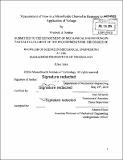Measurement of flow in a microfluidic channel in response to application of voltage
Author(s)
Soukup, Elizabeth A
DownloadFull printable version (5.056Mb)
Other Contributors
Massachusetts Institute of Technology. Department of Mechanical Engineering.
Advisor
José Alvarado.
Terms of use
Metadata
Show full item recordAbstract
This thesis explores two methods of calculating the flow of Electrorheological fluid in a microfluidic channel in response to a gradient in an electric field: MATLAB simulation and microscopy experiments. Electrorheological fluid, which is composed of particles suspended in a liquid, has the property of changing its viscosity under the application of an electric field. The particles become polarized in an electric field, aligning themselves with a force that is proportional to the gradient of the electric field. The drag force equally opposes the dipole force and can entrain fluid and force it to move along the length of a channel. The dipole force was estimated using a MATLAB simulation, and the drag force was calculated via experiments which used Electrorheological fluid in a channel lined with electrodes. Although the two methods did not correlate in magnitude, they did agree in terms of general behavior, and net motion of fluid in a channel was achieved.
Description
Thesis: S.B., Massachusetts Institute of Technology, Department of Mechanical Engineering, 2014. Cataloged from PDF version of thesis. Includes bibliographical references (page 20).
Date issued
2014Department
Massachusetts Institute of Technology. Department of Mechanical EngineeringPublisher
Massachusetts Institute of Technology
Keywords
Mechanical Engineering.